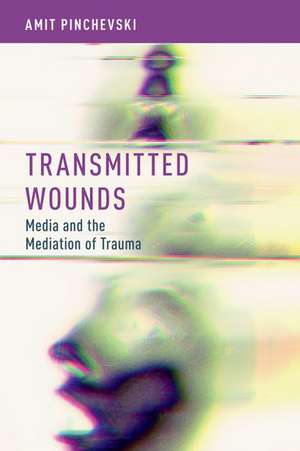Transmitted Wounds: Media and the Mediation of Trauma
Autor Amit Pinchevskien Limba Engleză Paperback – 13 oct 2021
| Toate formatele și edițiile | Preț | Express |
|---|---|---|
| Paperback (1) | 248.84 lei 3-5 săpt. | |
| Oxford University Press – 13 oct 2021 | 248.84 lei 3-5 săpt. | |
| Hardback (1) | 489.55 lei 10-16 zile | |
| Oxford University Press – 7 feb 2019 | 489.55 lei 10-16 zile |
Preț: 248.84 lei
Nou
Puncte Express: 373
Preț estimativ în valută:
47.62€ • 49.53$ • 39.31£
47.62€ • 49.53$ • 39.31£
Carte disponibilă
Livrare economică 24 martie-07 aprilie
Preluare comenzi: 021 569.72.76
Specificații
ISBN-13: 9780197600795
ISBN-10: 0197600794
Pagini: 198
Ilustrații: 11
Dimensiuni: 142 x 208 x 15 mm
Greutate: 0.25 kg
Editura: Oxford University Press
Colecția OUP USA
Locul publicării:New York, United States
ISBN-10: 0197600794
Pagini: 198
Ilustrații: 11
Dimensiuni: 142 x 208 x 15 mm
Greutate: 0.25 kg
Editura: Oxford University Press
Colecția OUP USA
Locul publicării:New York, United States
Recenzii
a very interesting read
Given Pinchevski's interest in the nondiscursive aspects of trauma and the various relationships among minds, technologies, and bodies, Transmitted Wounds begs to be put in conversation with affect theory...Pinchevski works to understand how media may capture these struggles and mediate the unmediated. Therefore, grounding Transmitted Wounds in affect scholarship would help illuminate the real that Pinchevski takes as his starting point.
Transmitted Wounds constitutes a significant contribution to the scholarship on the role of media in the transmission and working through of traumatic experiences. Pinchevski, on the communication and journalism faculty at Hebrew University in Israel, discusses five case studies....This is an important book for anyone interested in the relationships among media, trauma, and historical memory.
This book delves into the combustible mixture of mind and media. Amit Pinchevski follows the hint in recent media theory that media are not just cultural artifacts to be interpreted but fundamental infrastructures that constitute and provide access to whatever it is we think of as mind. His media formulation of trauma as the mediation of failed mediation may well become, once its full resonances are absorbed, field-defining. The book is a fascinating study for thoroughly tying together media and trauma, but it achieves much more by asking key moral questions about the meaning of immediacy, presence, and telepresence in the face of some of the major catastrophes of our time.
This thought-provoking book gives us new ways to understand the mediation of trauma and collective memory and the relationship between technology and human suffering. Eloquent and wise, Pinchevski's book raises urgent moral and political questions we all need to keep asking.
A highly original intervention into trauma theory. Pinchevksi's deft and erudite analyses shine a light on how the digital is shaping memories of traumatic pasts in new ways. Tackling an exciting range of material from videography and testimony to the uses of virtual reality for therapy, this is an outstanding research book which every student of memory should read.
Given Pinchevski's interest in the nondiscursive aspects of trauma and the various relationships among minds, technologies, and bodies, Transmitted Wounds begs to be put in conversation with affect theory...Pinchevski works to understand how media may capture these struggles and mediate the unmediated. Therefore, grounding Transmitted Wounds in affect scholarship would help illuminate the real that Pinchevski takes as his starting point.
Transmitted Wounds constitutes a significant contribution to the scholarship on the role of media in the transmission and working through of traumatic experiences. Pinchevski, on the communication and journalism faculty at Hebrew University in Israel, discusses five case studies....This is an important book for anyone interested in the relationships among media, trauma, and historical memory.
This book delves into the combustible mixture of mind and media. Amit Pinchevski follows the hint in recent media theory that media are not just cultural artifacts to be interpreted but fundamental infrastructures that constitute and provide access to whatever it is we think of as mind. His media formulation of trauma as the mediation of failed mediation may well become, once its full resonances are absorbed, field-defining. The book is a fascinating study for thoroughly tying together media and trauma, but it achieves much more by asking key moral questions about the meaning of immediacy, presence, and telepresence in the face of some of the major catastrophes of our time.
This thought-provoking book gives us new ways to understand the mediation of trauma and collective memory and the relationship between technology and human suffering. Eloquent and wise, Pinchevski's book raises urgent moral and political questions we all need to keep asking.
A highly original intervention into trauma theory. Pinchevksi's deft and erudite analyses shine a light on how the digital is shaping memories of traumatic pasts in new ways. Tackling an exciting range of material from videography and testimony to the uses of virtual reality for therapy, this is an outstanding research book which every student of memory should read.
Notă biografică
Amit Pinchevski is Associate Professor in the Department of Communication and Journalism at The Hebrew University of Jerusalem, Israel. He is the author of By Way of Interruption: Levinas and the Ethics of Communication (2005) and coeditor of two books, Media Witnessing: Testimony in the Age of Mass Communication (2009) and Ethics of Media (2013). His research interests are in philosophy and theory of communication and media.
